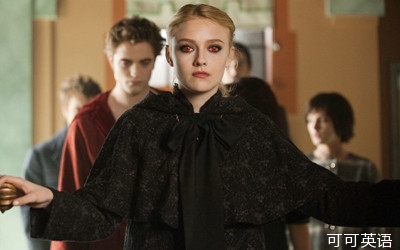"Sometimes it's more difficult than others."
“有些時(shí)候,這會(huì)比別的時(shí)候更困難些。”
"Is it very difficult for you now?" I asked.
“現(xiàn)在這對(duì)你來(lái)說(shuō)很困難嗎?”我問(wèn)道。
He sighed. "Yes."
他嘆息著。“是的。”
"But you're not hungry now," I said confidently — stating, not asking.
“但你現(xiàn)在不餓。”我肯定地說(shuō)——是陳述,而非詢(xún)問(wèn)。
"Why do you think that?"
“為什么你會(huì)這樣想呢?”
"Your eyes. I told you I had a theory. I've noticed that people — men in particular — are crabbier when they're hungry."
“你的眼睛。我告訴過(guò)你我有一個(gè)理論。我注意到人們——尤其是男人——饑餓的時(shí)候會(huì)更暴躁些。”
He chuckled. "You are observant, aren't you?"
他輕笑著:“你是個(gè)觀-察-家,不是嗎?”
I didn't answer; I just listened to the sound of his laugh, committing it to memory.
我沒(méi)有回答。我只是聽(tīng)著他的笑聲,把它銘刻在記憶里。
"Were you hunting this weekend, with Emmett?" I asked when it was quiet again.
“你上周末去狩獵了嗎,和艾美特一起?”當(dāng)我們?cè)俅伟察o下來(lái)的時(shí)候,我問(wèn)道。
"Yes." He paused for a second, as if deciding whether or not to say something. "I didn't want to leave, but it was necessary. It's a bit easier to be around you when I'm not thirsty."
“是的。”他停頓了一秒,似乎在決定某件事該不該說(shuō)。“我不想離開(kāi),但這很有必要。當(dāng)我不那么渴的時(shí)候,待在你周?chē)鷷?huì)更容易些。”
"Why didn't you want to leave?"
“為什么你不想離開(kāi)呢?”
"It makes me… anxious… to be away from you." His eyes were gentle but intense, and they seemed to be making my bones turn soft. "I wasn't joking when I asked you to try not to fall in the ocean or get run over last Thursday. I was distracted all weekend, worrying about you. And after what happened tonight, I'm surprised that you did make it through a whole weekend unscathed." He shook his head, and then seemed to remember something. "Well, not totally unscathed."
“這讓我……不安……因?yàn)椴辉谀闵磉叀!彼难劬軠厝幔行┚o張,它們幾乎要讓我的骨頭都酥了。“上周三我要你千萬(wàn)別掉進(jìn)海里,或者別被絆倒,那不是在開(kāi)玩笑。整個(gè)周末我都心浮氣躁,擔(dān)心著你。而在今晚發(fā)生的事以后,我很驚訝,你居然能毫發(fā)無(wú)損地平安度過(guò)整個(gè)周末。”他搖了搖頭,似乎想起了什么。“好吧,并不是完全毫發(fā)無(wú)損。”

《暮光之城》
與圖書(shū)題目相得益彰的是,“暮光之城”系列別具匠心的封面設(shè)計(jì)則很好地傳達(dá)出了每本書(shū)內(nèi)在的深遠(yuǎn)寓意。斯蒂芬妮·梅爾指出《暮色》封面上的蘋(píng)果代表“創(chuàng)世紀(jì)” 內(nèi)善惡樹(shù)上的禁果。象征貝拉和愛(ài)德華之間人類(lèi)與吸血鬼禁忌的愛(ài)戀。在書(shū)的開(kāi)頭引用了“創(chuàng)世紀(jì)”217頁(yè)的內(nèi)容:“只是分別善惡樹(shù)上的果子,你不可吃,因?yàn)槟愠缘娜兆颖囟ㄋ馈!边@同時(shí)也代表了貝拉如何分辨善惡——選擇是否吃下那顆禁忌的果實(shí),這比喻了選擇跟愛(ài)德華在一起或遠(yuǎn)離他。











